Overview
The title '10 Trends Shaping Agency Web Design for Tech Startups in 2025' highlights a significant concern for many tech startup founders: how to effectively navigate the evolving landscape of web design. As you strive to make your mark, the pressure to stand out can feel overwhelming. With emerging trends like:
- AI-driven personalization
- Responsive design
- Sustainable web practices
it's essential to recognize how these elements can enhance user experience and engagement. After all, these factors are crucial for your success in a competitive digital environment. Embracing these trends not only addresses the immediate challenges you face but also provides a nurturing pathway toward growth and connection with your audience. Together, we can explore how these innovations can serve as a foundation for your startup's future, ensuring you not only survive but thrive.
Introduction
In the ever-changing world of technology, web design has evolved beyond mere aesthetics; it has become a vital component that can determine a startup's success. As we look towards 2025, many tech startups grapple with the daunting challenge of standing out in a crowded marketplace, all while managing the intricacies of user engagement and conversion. This article explores ten transformative trends that are shaping agency web design, offering valuable insights into how startups can harness innovative strategies—from AI-driven personalization to sustainable practices—to craft engaging digital experiences. But what does it truly take to not only survive but thrive in this competitive landscape? Let's navigate this journey together and discover the possibilities ahead.
RNO1: Pioneering Radical Digital Experiences in Web Design
In today’s fast-paced digital world, tech startup founders often grapple with the challenge of making their mark. The pressure to stand out in an increasingly crowded market can feel overwhelming. Many founders experience the pain of being lost in a sea of competitors, struggling to communicate their unique value. This is where RNO1 steps in, offering a nurturing hand to guide startups through these turbulent waters.
RNO1 spearheads the effort in agency web design, seamlessly merging advanced technology with inventive branding strategies. Their commitment to radical digital experiences empowers tech startups to differentiate themselves, fostering a sense of confidence and clarity. By utilizing unique subscription models and providing essential services such as UX & UI creation and SEO strategy, RNO1 ensures continuous support and innovation. This enables brands to swiftly adapt to , alleviating the stress that comes with uncertainty.
The impact of RNO1’s approach is profound. Not only does it enhance engagement, but it also promotes sustainable growth. Design-driven companies report 50% more loyal clients, highlighting the importance of aesthetics in shaping perceptions. As Jony Ive aptly observes, aesthetics is often the most immediate way to define how products are perceived. This insight underscores the significance of RNO1's strategy for startups aiming to make a lasting impact.
By fostering an environment of support and understanding, RNO1 stands as a beacon for tech startups, guiding them toward success and encouraging them to share their experiences. Together, they can navigate the complexities of the digital landscape, ensuring that every startup has the opportunity to shine.
User-Centric Design: Enhancing Engagement and Conversion Rates
Customer-focused design is essential for creating websites that truly reflect individual needs and preferences. At RNO1, we genuinely care about adopting a design-centered approach in every interaction, ensuring our solutions not only meet but exceed expectations. Many tech startups struggle with engaging their audience effectively, which can lead to missed opportunities. By implementing audience testing and feedback loops, agencies can significantly enhance engagement and improve conversion rates. This nurturing approach translates into designing intuitive interfaces that promote seamless navigation and foster positive experiences for users.
Investing in user experience (UX) enhancement is not just beneficial; it can yield remarkable returns. Each $1 spent can produce an average return of $100, showcasing an astonishing 9,900% ROI. This statistic highlights the financial advantages of prioritizing user-centric strategies. Moreover, studies reveal that websites with effective user experiences can achieve conversion rates of up to 400%. It's important to remember that 86% of consumers express they would abandon a brand after just two negative experiences. By focusing on client testing, startups can not only boost sales but also cultivate long-term customer loyalty, making this a vital aspect of in 2025.
We invite you to reflect on your own experiences with user engagement. Have you ever felt frustrated navigating a website? At RNO1, we understand these challenges and are here to help you navigate them with compassion and expertise. Together, we can create a user experience that resonates deeply with your audience and drives your success.
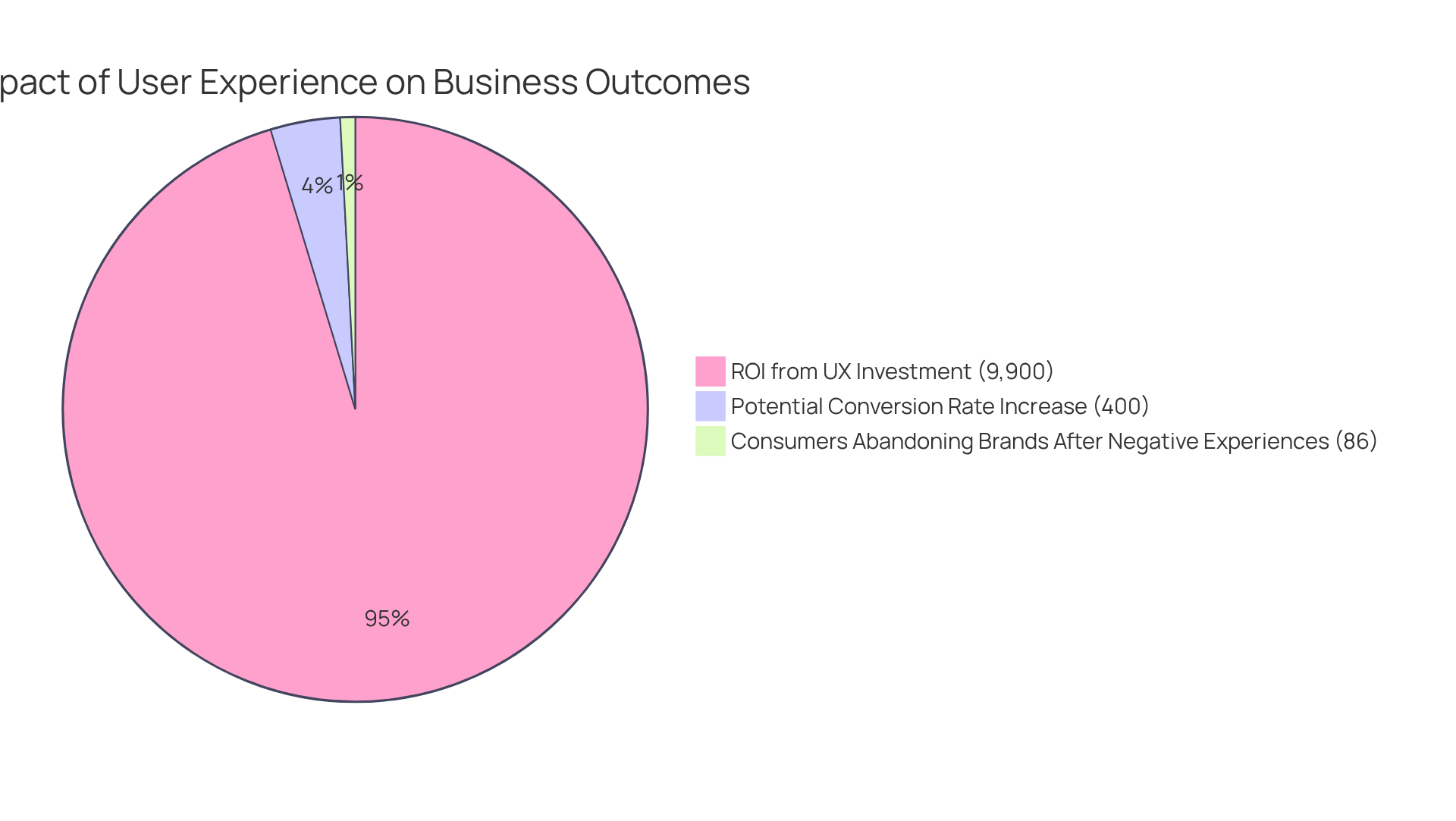
eCommerce Solutions: Transforming Agency Web Design Strategies
As eCommerce continues to flourish, agencies like RNO1 face the pressing challenge of enhancing their web development strategies to meet the unique demands of online retail. Many founders may feel overwhelmed by the staggering cart abandonment rates—currently at 80.2% on mobile devices—which can be disheartening. This issue underscores the necessity for streamlined checkout processes, as they can significantly alleviate this pain point.
Moreover, with 67% of e-commerce sales now occurring on mobile platforms, mobile optimization becomes paramount. It’s heartening to note that mobile-optimized product pages convert 102% better than their desktop counterparts, offering a glimmer of hope for improvement. Additionally, the rise of mobile wallets like Apple Pay and Google Pay, which drive 60% of digital transactions worldwide, highlights our growing reliance on mobile payment methods. This shift can feel daunting, yet it presents an opportunity for growth.
Personalization stands out as another critical element; can greatly enhance customer engagement and loyalty. It’s inspiring to see that 88% of marketers are investing in personalization to improve user experience, demonstrating a collective commitment to understanding customer needs.
Furthermore, the projected growth of social commerce into a $1 trillion market by 2028 emphasizes the importance of weaving social media strategies into eCommerce platforms. RNO1's results-oriented approach, as illustrated through successful case studies like Cirkul, showcases how a focus on user-centered development and performance marketing expertise can lead to increased conversion rates and customer satisfaction.
By prioritizing these elements, agencies can empower technology companies to build compelling eCommerce platforms that not only attract visitors but also convert them into loyal customers. Together, we can navigate these challenges and foster a thriving eCommerce landscape.
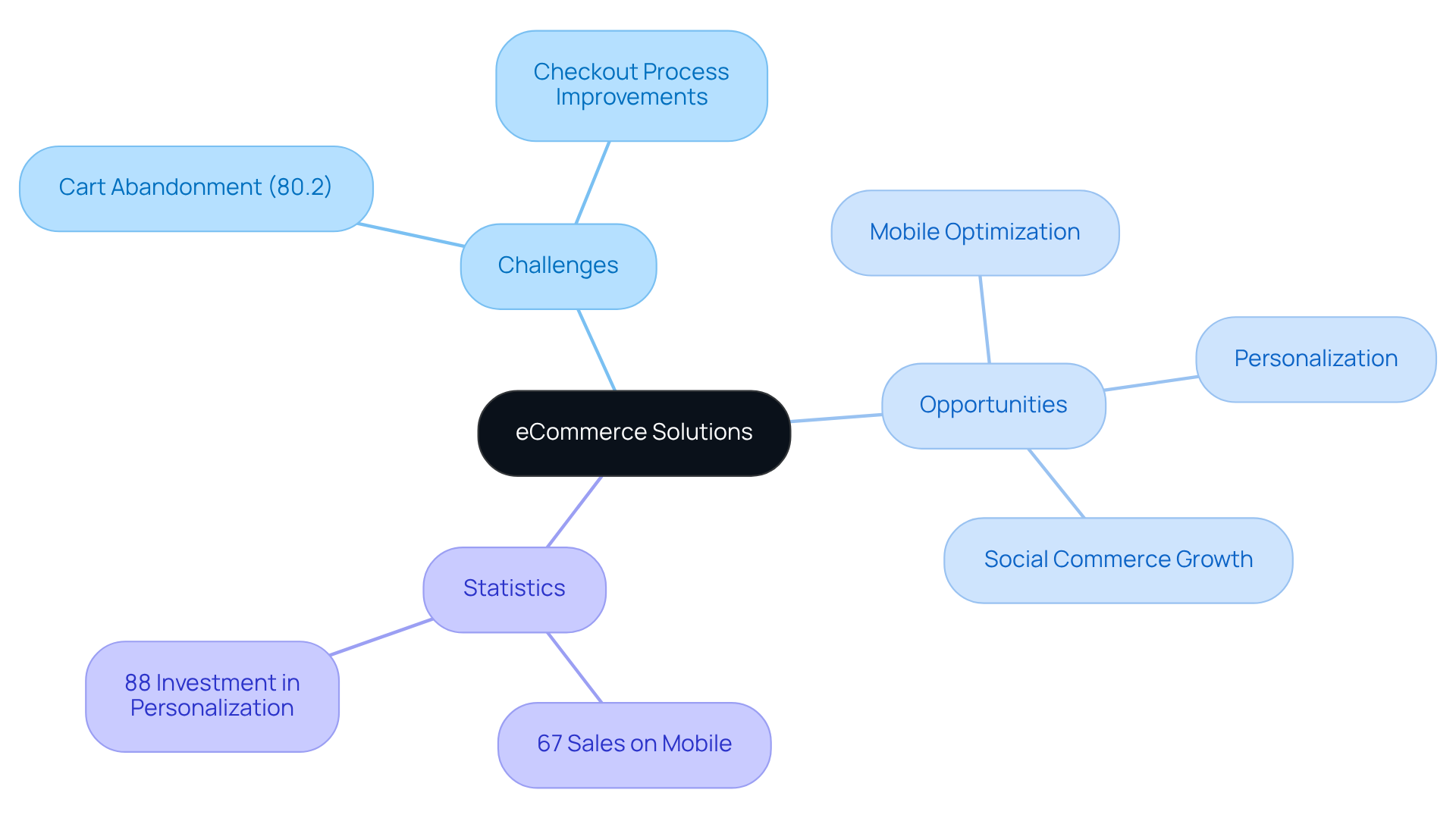
VR and AR Integration: Creating Immersive User Experiences
In today's digital landscape, many tech startups face the challenge of creating engaging web experiences through effective agency web design that truly resonate with users. This struggle can lead to missed opportunities for connection and loyalty, which are vital for long-term success. Fortunately, Virtual Reality (VR) and Augmented Reality (AR) are here to help. By providing immersive experiences, these technologies allow users to engage on a deeper level, fostering memorable interactions that can significantly boost customer loyalty.
Imagine a customer being able to visualize products in their own space before making a purchase. This capability effectively bridges the gap between online shopping and real-world application, enhancing the overall shopping experience. Retailers have reported up to a 40% increase in customer engagement through AR-powered applications, especially in the context of agency web design. This is not just a trend; it’s a transformative opportunity for startups to stand out in a crowded market.
Looking ahead to 2025, we can expect to see exciting trends in VR and AR web development, such as the integration of virtual showrooms. These immersive environments will allow users to explore products in a way that feels natural and engaging. Experts predict that as these technologies evolve, they will become more accessible, enabling startups to implement them without needing extensive resources. Successful instances, like IKEA's AR furniture visualization tools, demonstrate the concrete advantages of these immersive experiences, showcasing a 30% rise in online sales and a 25% decrease in product returns.
The impact of VR and AR on participant engagement is profound. Studies indicate that immersive experiences can enhance learning efficiency and retention rates by 30% in educational settings. This improvement translates to , making interactions not only more intuitive but also captivating. By embracing VR and AR, technology ventures can enhance their agency web design while crafting engaging stories that resonate with their audience. This approach fosters growth and innovation in the digital realm, nurturing a community of loyal customers eager to connect with your brand.
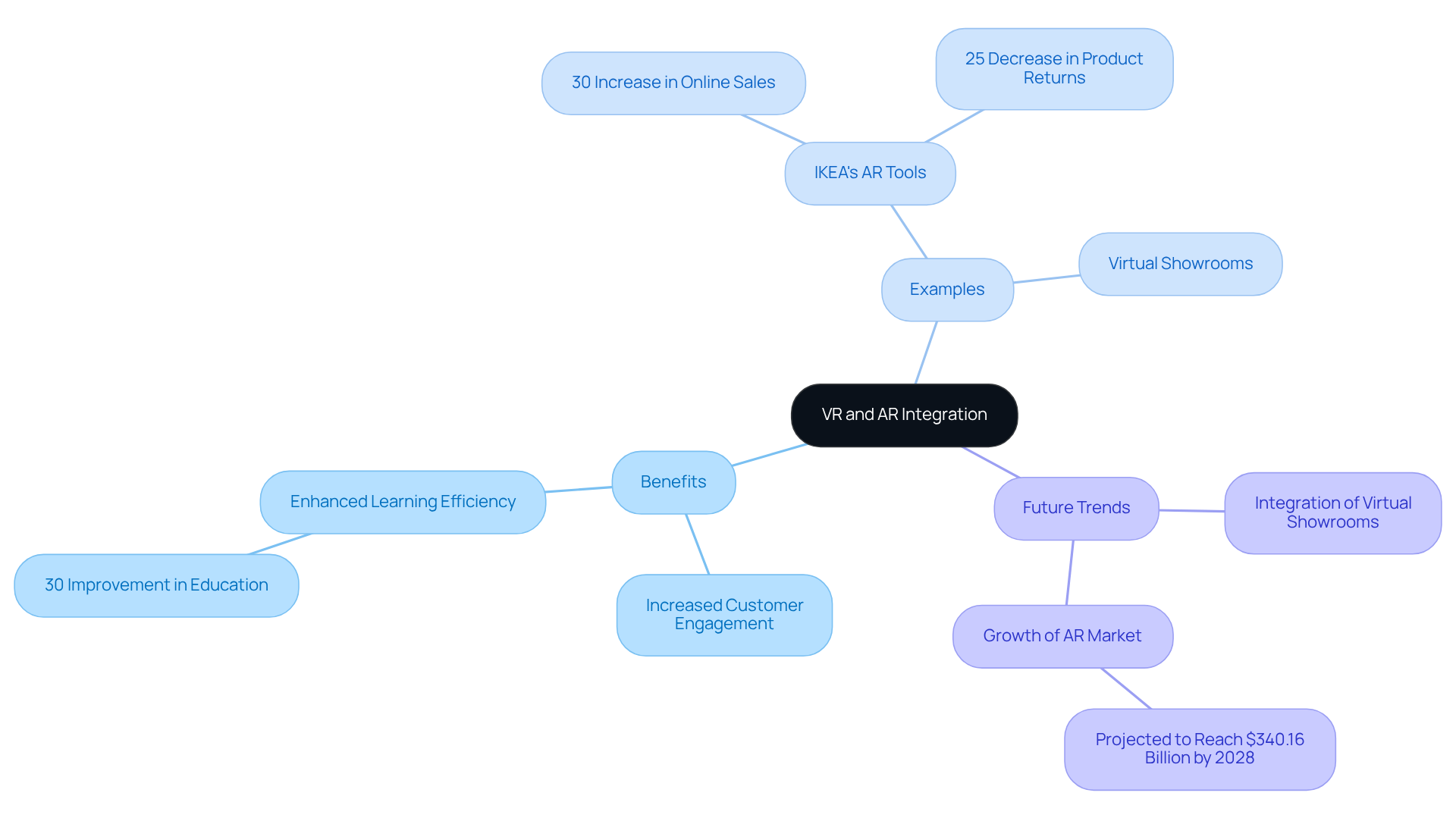
Performance Marketing Strategies: Driving Traffic and ROI
For technology companies, performance marketing strategies can often feel like a daunting challenge. Many founders struggle to drive traffic and maximize their return on investment (ROI), which can lead to feelings of frustration and uncertainty. At RNO1, we understand these concerns deeply, and we are committed to delivering measurable success from the very beginning. If we’re not over-delivering on results, we recognize we might not be the right partner for you.
By seamlessly integrating analytics into our agency web design, our dedicated teams gain valuable insights into visitor behavior. This understanding allows us to enhance marketing efforts effectively, ensuring that your website not only attracts visitors but also converts them into paying customers. Imagine using Google Analytics to monitor key metrics like engagement and conversion rates; this clarity can illuminate what works and what doesn’t, guiding your decisions.
A/B testing becomes a powerful tool in this journey, helping to identify the most effective elements that enhance engagement and conversion rates. It’s a reminder of the importance of data-driven decision-making in today’s digital landscape. Moreover, expert opinions consistently highlight that focusing on user-centered design and continuous optimization can significantly uplift traffic and conversion rates.
As Neil Patel wisely notes, creating content that meets your audience's needs is essential for success. Understanding the purchase funnel is equally crucial, as it enables you to track visitor navigation from product pages to checkout, ultimately enhancing conversion rates in e-commerce scenarios. With 93% of online journeys starting with a search engine, incorporating analytics into is vital for boosting traffic and improving ROI.
We encourage startups to regularly assess their Google Analytics data to refine their website strategies and ensure they are meeting audience expectations. By partnering with RNO1, you can leverage our unwavering commitment to measurable success through collaborative strategies, allowing you to focus on what you do best—growing your business.
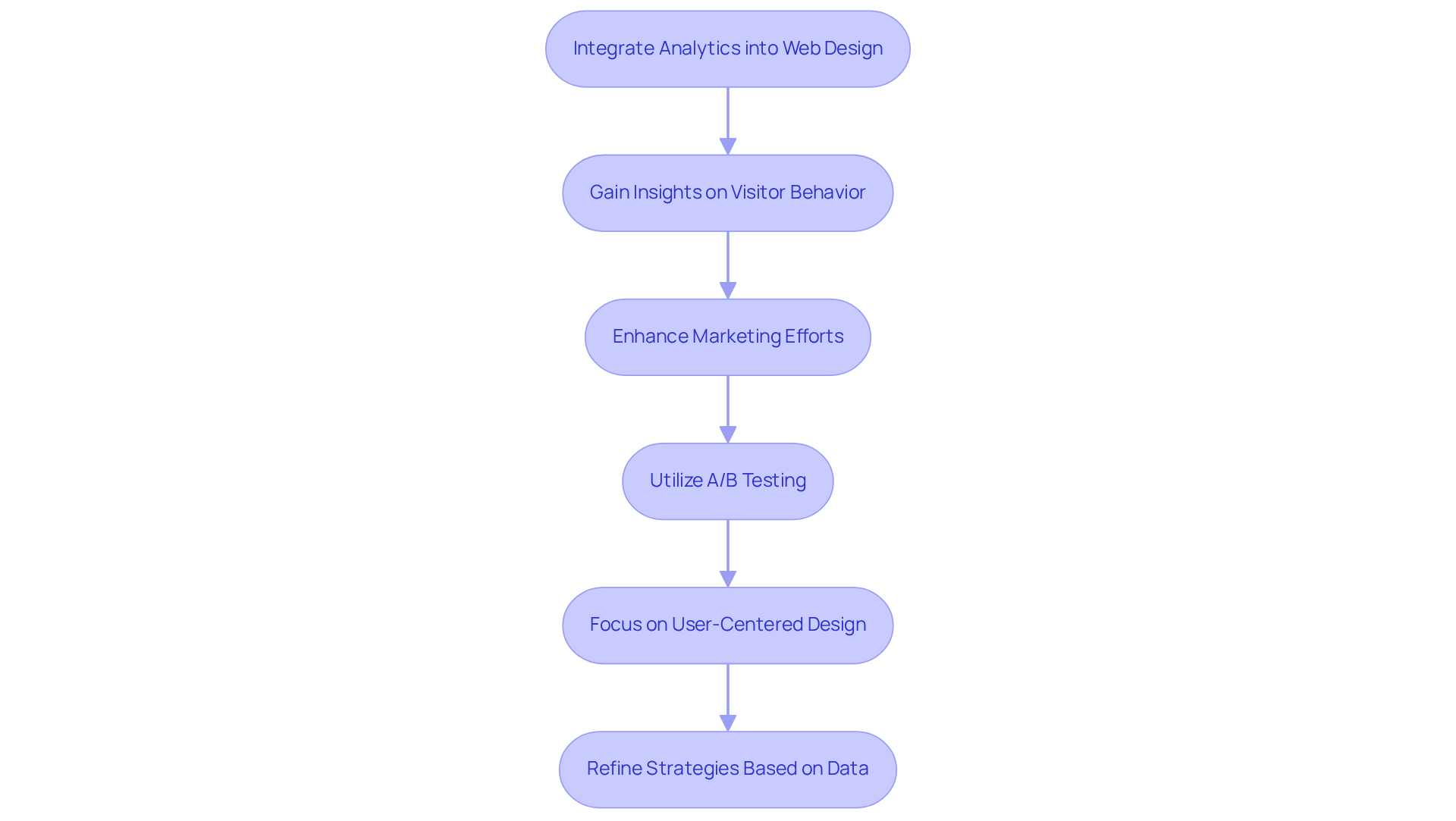
Responsive Design: Ensuring Optimal Performance Across Devices
As we step into 2025, many tech startup founders face a common challenge: ensuring their websites are accessible across a multitude of devices. It's a pressing issue, as more individuals turn to their smartphones, tablets, and laptops for information. is not just a nice-to-have; it dynamically adjusts to various screen sizes, providing an optimal performance and user experience that can make all the difference. Without it, businesses risk losing potential clients and engagement.
Consider the implications: investing in flexible layouts and scalable images is essential. These elements significantly enhance usability and can help reduce bounce rates, which is a pain point for many startups. Statistics show that responsive websites achieve 11% higher conversion rates compared to their non-responsive counterparts. Even more striking, mobile-friendly websites see a 40% higher conversion rate than those that are not optimized. This data underscores the effectiveness of responsive design in improving overall engagement and success.
There are many encouraging stories out there. For instance, EcoFoil experienced an impressive 86% rise in purchases after enhancing their homepage design for mobile visitors. Similarly, Majestic Wine saw a remarkable 201% boost in inquiry form submissions following the redesign of their category page. These examples illustrate that an effortless experience can significantly enhance conversion rates—by as much as 400%, according to industry experts. Steve Herz emphasizes this by stating, "Responsive layout increases: Time on site, Click-through rates, Form submissions, and purchases."
In this competitive digital landscape, adopting the latest trends in mobile-friendly website development is essential. Currently, 62% of leading sites are optimized for mobile, and this is a crucial step for tech startups looking to improve client satisfaction and stimulate growth. By investing in adaptive layouts, you ensure your website adjusts smoothly across devices, enhancing user experience and boosting conversions. Remember, this adaptive strategy is not merely a trend; it’s an essential requirement for success. Together, let’s embrace these changes and create a thriving digital presence.
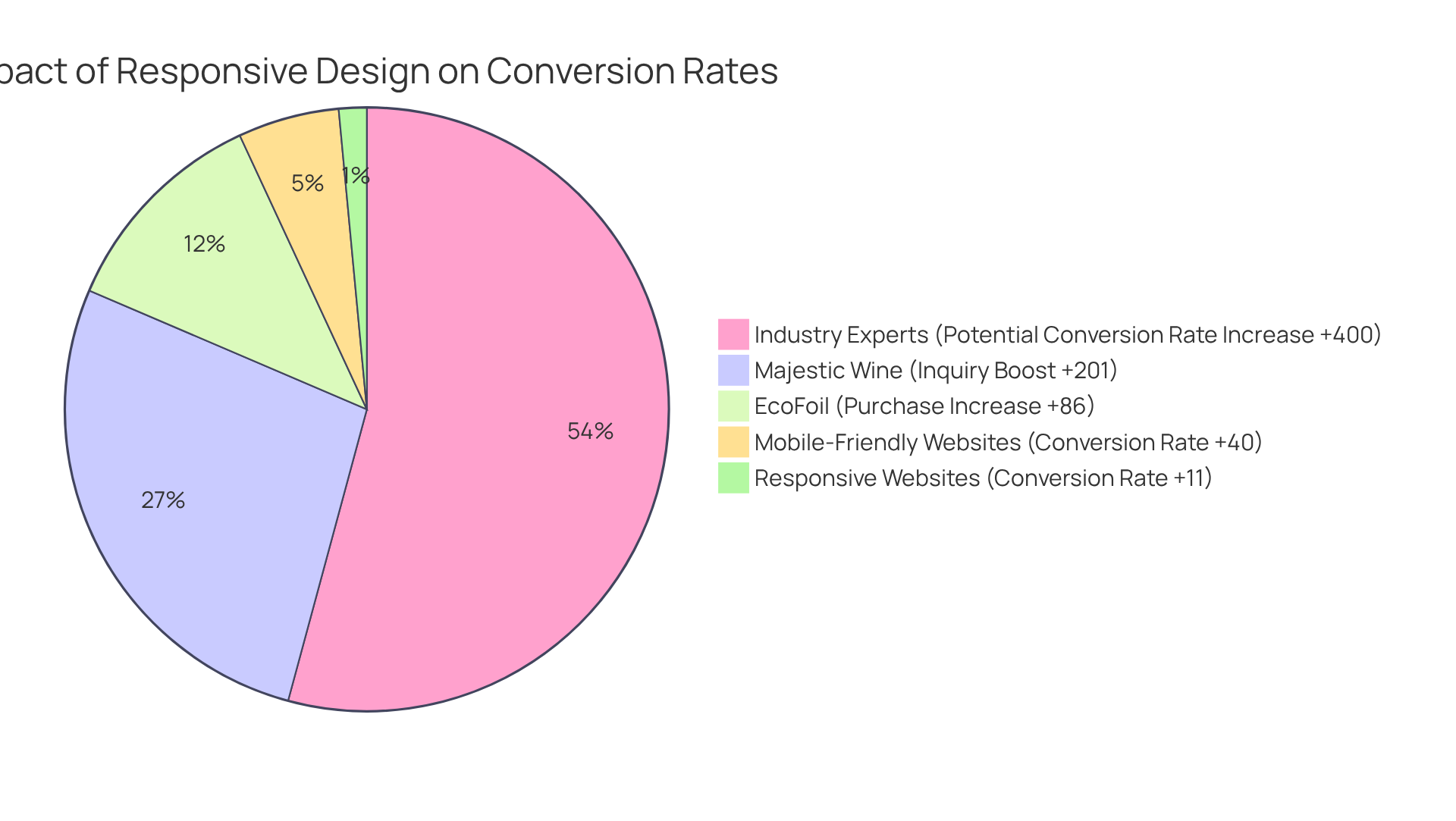
Sustainable Web Design: Embracing Eco-Friendly Practices
Sustainable web development is an essential step towards reducing our environmental impact while enhancing user experience. Many tech startups face the challenge of balancing growth with ecological responsibility. The implications of neglecting this balance can be profound, as consumers increasingly seek out brands that align with their values. Key practices, such as:
- Optimizing code for efficiency
- Utilizing green hosting solutions
- Designing for low energy consumption
can help address these concerns. By embracing these eco-friendly strategies, startups can attract environmentally conscious consumers, distinguishing themselves in a competitive market.
Consider how companies that adopt sustainable practices not only lessen their carbon footprint but also resonate with a growing demographic that prioritizes sustainability in their purchasing decisions. As Jochen Zeitz poignantly stated, "Sustainability is no longer about doing less harm. It’s about doing more good." This alignment with consumer values fosters enhanced brand loyalty and engagement, positioning agency web design that emphasizes eco-friendly website development as a strategic advantage in the tech industry.
Looking ahead, by 2025, implementing sustainable design choices will significantly reduce the digital carbon footprint. The anticipated advancements in web technology will further support these eco-friendly practices. Additionally, the rise of hosting services powered by renewable energy illustrates how tech startups can effectively integrate sustainable practices into their operations. Together, we can create , one website at a time.
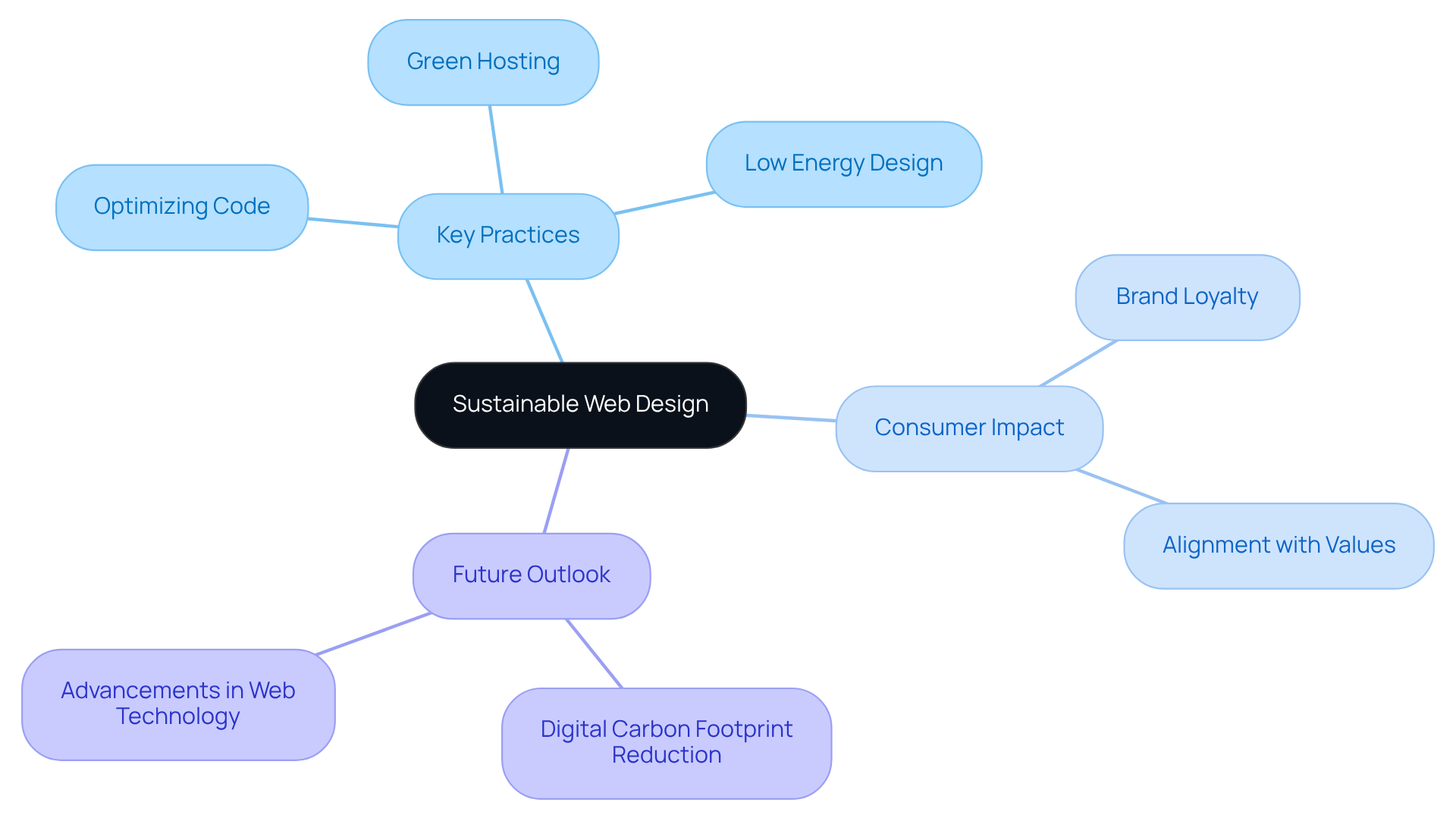
AI-Driven Personalization: Revolutionizing User Experiences
In today's digital landscape, many tech startup founders face the challenge of creating meaningful interactions on their websites. It's disheartening when visitors don't engage, leaving founders to wonder how they can make their offerings resonate. This struggle can lead to missed opportunities for conversion and lasting customer relationships. Fortunately, AI-driven personalization offers a compassionate solution. By harnessing advanced algorithms to analyze client data, AI can create tailored content, product suggestions, and interfaces that align with individual preferences. This personalized approach not only fosters deeper engagement but also significantly enhances conversion rates and nurtures customer loyalty.
At RNO1, we understand that for new ventures, incorporating AI into website design is more than just a trend; it's a vital strategy that leads to more relevant and fulfilling interactions. Our commitment to design-oriented solutions ensures that these AI integrations are not only functional but also visually inviting, enriching the overall experience for users. As more companies embrace AI technologies, those who prioritize personalization are projected to achieve up to 40% more revenue than their slower-growing peers. This underscores the importance of RNO1's focus on merging functionality with aesthetic appeal, a crucial element for new businesses striving to thrive in a competitive market.
We invite you to and challenges in this journey. Together, we can explore how RNO1 can support your vision, helping you create a website that not only meets your needs but also resonates with your audience, fostering a sense of community and connection.
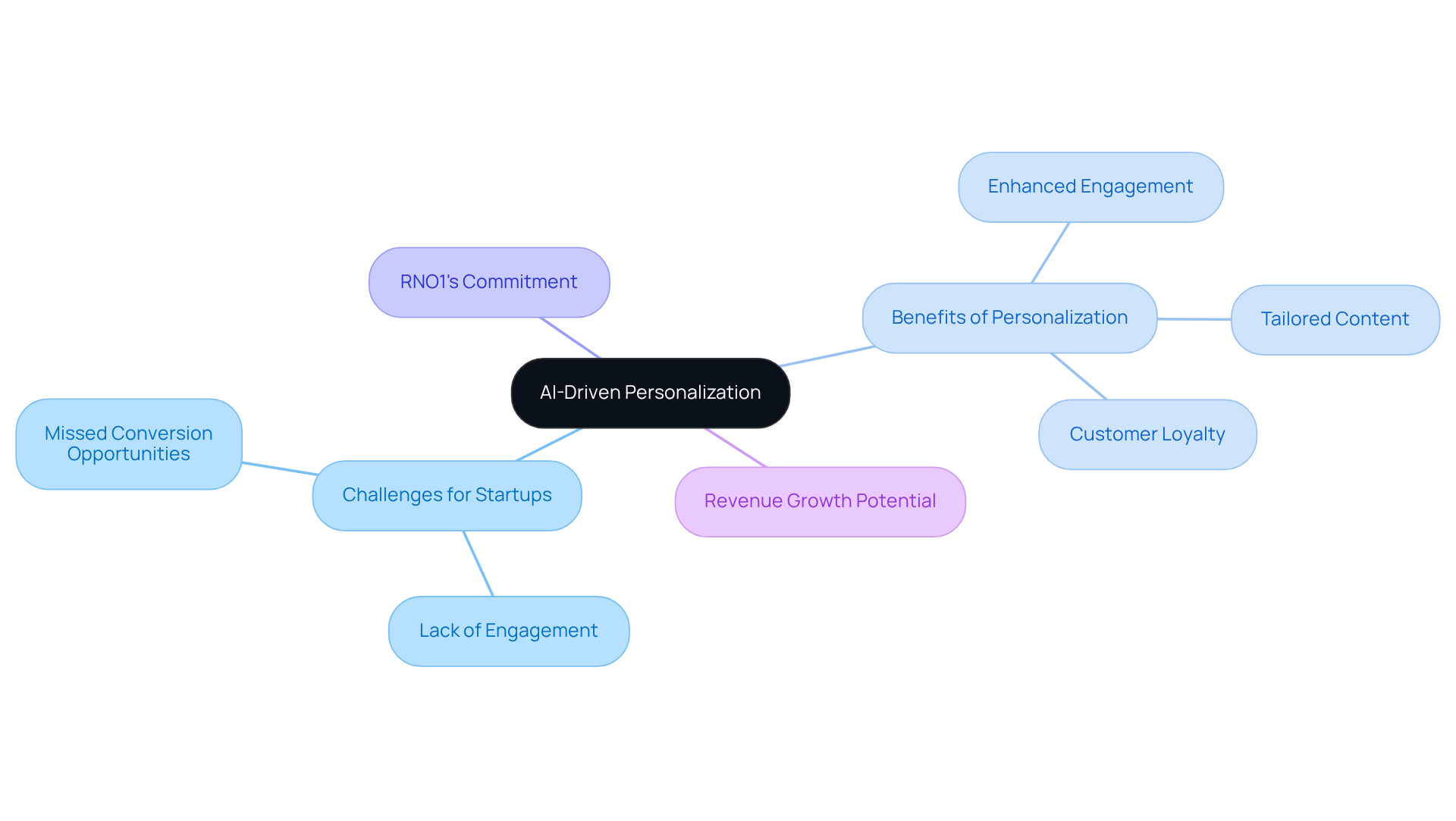
Accessibility in Web Design: Ensuring Inclusivity for All Users
Creating accessible web layouts is essential to ensure that every user, regardless of their abilities, can easily navigate and engage with a website. The challenge lies in the fact that many websites overlook crucial features, such as alt text for images, keyboard navigation, and clear visual hierarchies. This oversight not only alienates users with disabilities but also limits the potential audience for technology companies. By neglecting accessibility, companies may inadvertently miss out on connecting with a significant portion of their market.
Imagine a user who struggles with visual impairments trying to access information on a website that lacks alt text. Their frustration grows as they realize that they cannot fully engage with the content. This scenario highlights the importance of prioritizing accessibility—not just as a legal requirement, but as a moral imperative. When tech companies embrace accessibility, they not only broaden their audience but also enhance their and foster a sense of community.
At RNO1, we understand the emotional and professional needs of tech startup founders. We believe that by implementing accessible design principles, you can create a welcoming environment for all users. Our team is dedicated to guiding you through the process of making your website more inclusive, ensuring that everyone can participate in the digital world. Together, we can build a future where accessibility is at the forefront, allowing every user to feel valued and included.
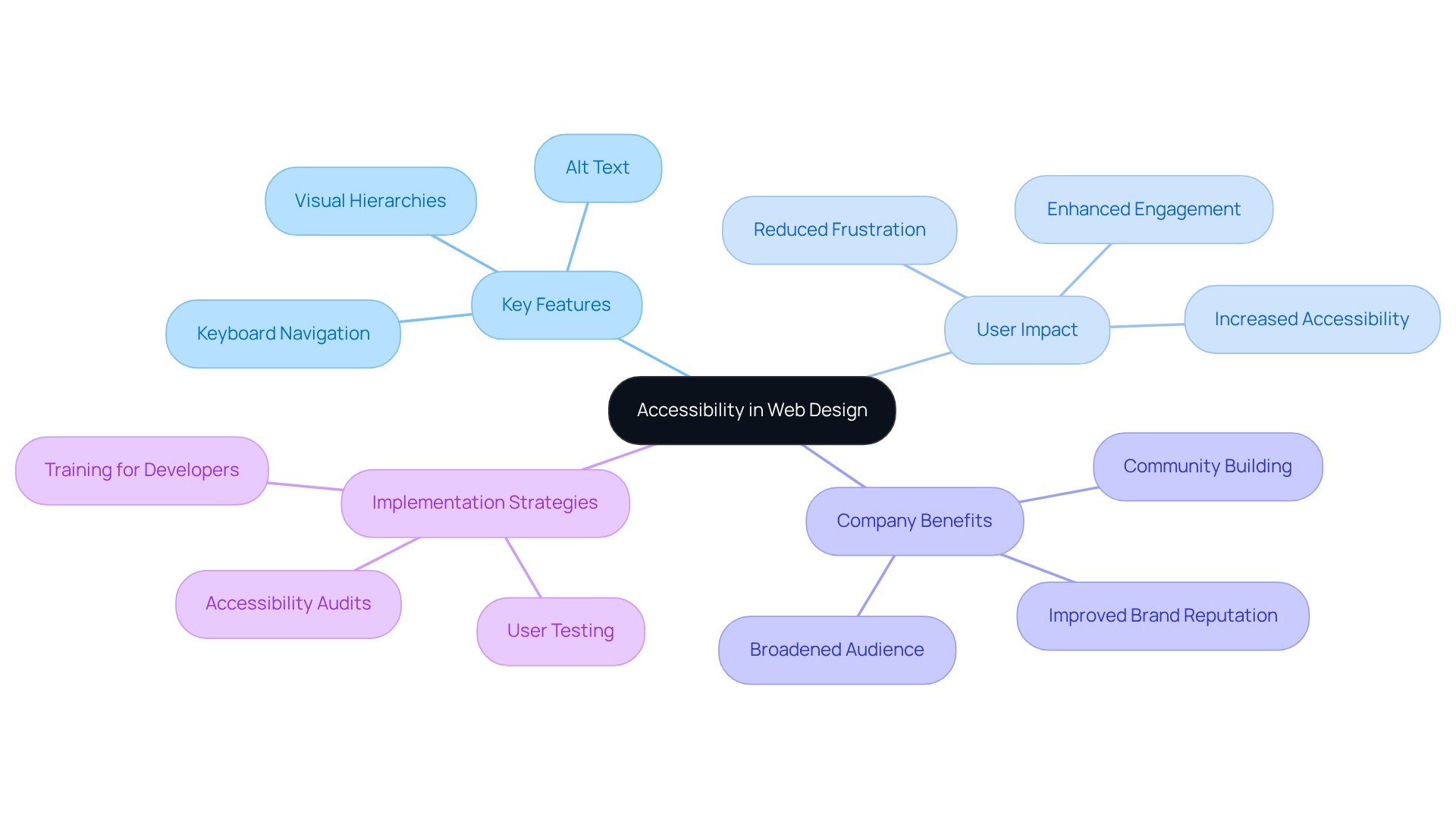
Subscription-Based Models: Redefining Agency Client Relationships
For many tech startups, the journey can often feel daunting, especially when faced with the heavy burden of large upfront costs for essential design services. This financial strain can hinder innovation and growth, leaving founders feeling overwhelmed and uncertain about their next steps. However, there is a compassionate solution that can ease these concerns: subscription-based models. These models are transforming how agencies interact with clients, providing ongoing support and flexibility that fosters long-term relationships.
Imagine having access to vital services like UX/UI design, branding, and digital strategy without the stress of significant initial investments. This approach not only alleviates financial pressure but also nurtures a collaborative environment where creativity can flourish. RNO1 beautifully exemplifies this trend through its strategic partnerships, such as with Interos for cross-channel brand rollout and Headset.io to scale digital product strategy via .
By offering subscription plans tailored to client needs, agencies like RNO1 ensure a continuous cycle of innovation and adaptation to market trends. This commitment empowers modern brands to create radical digital experiences across platforms, fostering a sense of community and shared success. These partnerships are designed to enhance client retention and satisfaction, positioning RNO1 as a trusted advisor in an ever-evolving digital landscape. Together, we can navigate these challenges and build a brighter future for your brand.
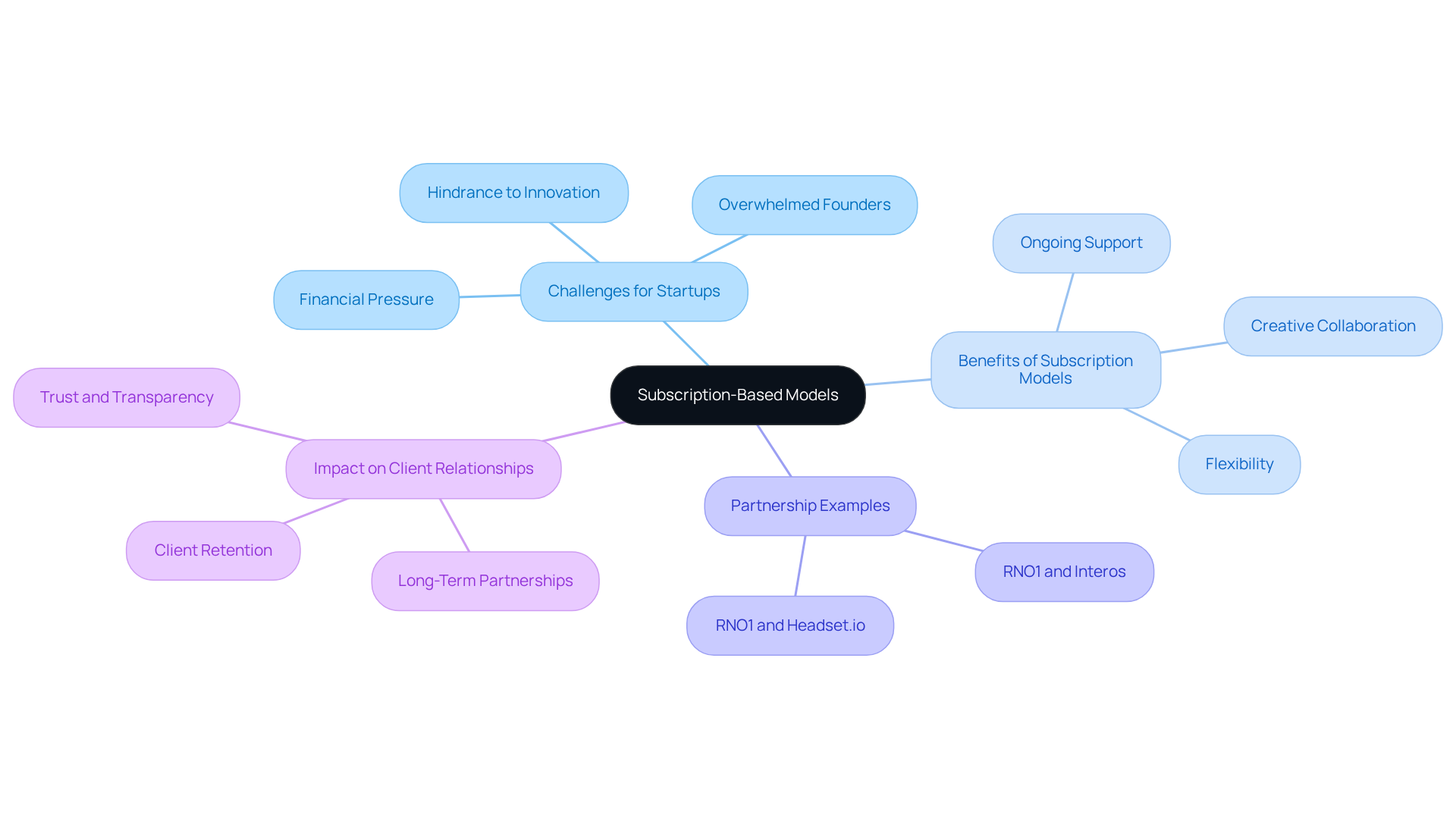
Conclusion
In the ever-evolving world of web design for tech startups, many founders face the challenge of staying relevant and engaging in a competitive landscape. As we look towards 2025, it’s increasingly clear that innovation and adaptability are not just buzzwords; they are essential for survival. Embracing transformative strategies—from user-centric design to sustainable practices—can truly enhance your startup's ability to connect with users and drive conversions. By focusing on creating unique, immersive experiences, you not only help your startup stand out but also build lasting connections with your audience.
Key insights reveal that prioritizing user experience and leveraging advanced technologies like AI, VR, and AR can lead to remarkable improvements in engagement and customer loyalty. However, many startups struggle with these concepts, feeling overwhelmed by the pace of change. It’s important to recognize that adopting responsive design and performance marketing strategies is crucial for maximizing your reach and ROI. Sustainable web design practices resonate with environmentally conscious consumers and position your startup as a leader in a market increasingly focused on corporate responsibility.
Ultimately, the future of web design transcends aesthetics; it’s about creating meaningful interactions and fostering inclusivity. We encourage you to explore these trends actively, integrating them into your strategies to craft compelling digital experiences. By taking these steps, you not only enhance your brand presence but also contribute to a more sustainable and inclusive digital ecosystem. Embrace these changes with an open heart, and let innovation guide your journey toward success in the competitive tech landscape. Remember, you are not alone in this journey; together, we can create a brighter future for all.
Frequently Asked Questions
What is RNO1 and what role does it play in web design for tech startups?
RNO1 is an agency that specializes in web design for tech startups, combining advanced technology with innovative branding strategies. They help startups differentiate themselves in a crowded market by providing support and guidance through services like UX & UI creation and SEO strategy.
How does RNO1 enhance user engagement and conversion rates?
RNO1 adopts a customer-focused design approach, utilizing audience testing and feedback loops to create intuitive interfaces that improve navigation and user experience. This leads to higher engagement and conversion rates, with studies showing that effective user experiences can yield conversion rates of up to 400%.
What financial benefits can startups expect from investing in user experience (UX)?
Investing in user experience can yield significant returns, with an average return of $100 for every $1 spent, representing a 9,900% ROI. This highlights the financial advantages of prioritizing user-centric strategies in web development.
What challenges do eCommerce agencies face, and how does RNO1 address them?
eCommerce agencies face challenges like high cart abandonment rates and the need for mobile optimization. RNO1 addresses these by creating streamlined checkout processes and optimizing product pages for mobile, which convert 102% better than desktop pages.
Why is personalization important in eCommerce, and how is RNO1 responding to this trend?
Personalization enhances customer engagement and loyalty, with 88% of marketers investing in it to improve user experience. RNO1 focuses on tailored shopping experiences to meet customer needs, thus empowering tech companies to build compelling eCommerce platforms.
How is social commerce expected to grow, and what implications does this have for web design?
Social commerce is projected to become a $1 trillion market by 2028, emphasizing the need for integration of social media strategies into eCommerce platforms. RNO1's approach includes leveraging performance marketing expertise to enhance customer satisfaction and conversion rates in this evolving landscape.




